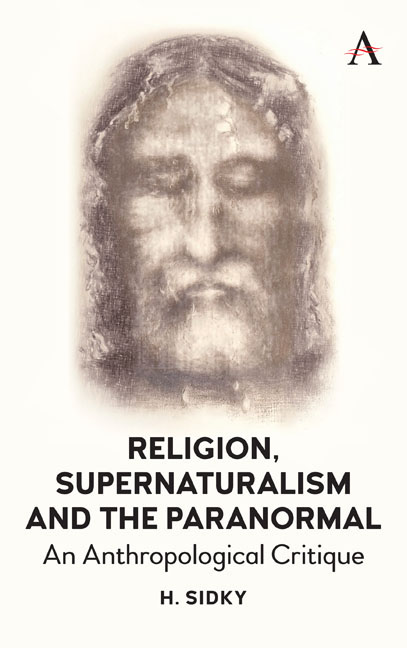Book contents
- Frontmatter
- Dedication
- Contents
- Acknowledgments
- Introduction
- Chapter One The Problem with Religion: Preliminary Issues
- Chapter Two The Unreal Real: The Supernatural, Religion, and the Paranormal
- Chapter Three Can Science Say Anything About Religion and the Supernatural?
- Chapter Four Ghostly Rappings, the Science of the Soul, and the Religious Nature of the Paranormal
- Chapter Five Ghostly Encounters in the Field: Anthropology of the Paranormal or Paranormal Anthropology?
- Chapter Six Why We Think the World Is Haunted
- Chapter Seven Cognitive Biases and Why People Think Eerie Thoughts
- Chapter Eight Miracles as Evidence of God's Actions in the World
- Chapter Nine When God Talks to People: Are Religious Experience Evidence of God?
- Chapter Ten Books Authored by God? Sacred Texts as Evidence of the Supernatural
- Chapter Eleven God's Fingerprints in the Natural World: Intelligent Design, Irreducible Complexity, and Cosmic Fine-Tuning
- Chapter Twelve The Miracles of the Bible: The Quintessential Foundations of Paranormal Beliefs in Western Culture
- Chapter Thirteen Jesus the Miracle Worker, Magician, and Sorcerer
- Chapter Fourteen Jesus's Empty Tomb, Missing Body, and Return from The Dead: Sources for the Paranormal Tale
- Chapter Fifteen The Post-Resurrection Appearances in the New Testament
- Chapter Sixteen Coping with Failed Prophesy: A Socio-Psychological Explanation for the Rise of Christianity
- Chapter Seventeen Conclusions: Why Religious and Paranormal Beliefs Persist and Their Dangers
- References
- Index
Chapter Fifteen - The Post-Resurrection Appearances in the New Testament
Published online by Cambridge University Press: 16 December 2019
- Frontmatter
- Dedication
- Contents
- Acknowledgments
- Introduction
- Chapter One The Problem with Religion: Preliminary Issues
- Chapter Two The Unreal Real: The Supernatural, Religion, and the Paranormal
- Chapter Three Can Science Say Anything About Religion and the Supernatural?
- Chapter Four Ghostly Rappings, the Science of the Soul, and the Religious Nature of the Paranormal
- Chapter Five Ghostly Encounters in the Field: Anthropology of the Paranormal or Paranormal Anthropology?
- Chapter Six Why We Think the World Is Haunted
- Chapter Seven Cognitive Biases and Why People Think Eerie Thoughts
- Chapter Eight Miracles as Evidence of God's Actions in the World
- Chapter Nine When God Talks to People: Are Religious Experience Evidence of God?
- Chapter Ten Books Authored by God? Sacred Texts as Evidence of the Supernatural
- Chapter Eleven God's Fingerprints in the Natural World: Intelligent Design, Irreducible Complexity, and Cosmic Fine-Tuning
- Chapter Twelve The Miracles of the Bible: The Quintessential Foundations of Paranormal Beliefs in Western Culture
- Chapter Thirteen Jesus the Miracle Worker, Magician, and Sorcerer
- Chapter Fourteen Jesus's Empty Tomb, Missing Body, and Return from The Dead: Sources for the Paranormal Tale
- Chapter Fifteen The Post-Resurrection Appearances in the New Testament
- Chapter Sixteen Coping with Failed Prophesy: A Socio-Psychological Explanation for the Rise of Christianity
- Chapter Seventeen Conclusions: Why Religious and Paranormal Beliefs Persist and Their Dangers
- References
- Index
Summary
If this Jesus were trying to convince anyone of his powers, then surely he ought to have appeared first to the Jews who mistreated him— and to his accusers— indeed to everyone, everywhere. […] When he was punished, everyone saw; yet risen from the tomb, almost no one.
— Celsus, On the True Doctrine (circa 185 CE)The story of Jesus Christ appearing after he was dead is the story of an apparition, such as timid imaginations can always create in vision, and credulity believe. Stories of this kind had been told of the assassination of Julius Caesar, not many years before; and they generally have their origin in violent deaths, or in the execution of innocent persons.
— Thomas Paine, The Age of Reason (1795)Why did [Jesus] not show conclusively, before hostile witnesses, the reality of his triumph over death […] thus proving the divinity of his mission, and of saving future generations from infinite difficulties and perplexities? […] If the object of Jesus was the salvation of the world, why should he have concealed from the world the divine ratification of his claims?
— Charles Gorham, The First Easter Dawn (1908)It is difficult to avoid the conclusion that we are in the domain of religious romance, not of religious history.
— Ernest William Barnes, The Rise of Christianity (1948)There are no actual witnesses to the greatest miracles of Christianity, namely that a risen Jesus walked out of the tomb in which his lifeless body had been placed. These events are a product of imagination. The belief that he rose from the dead originates from reports by his disciples that they had seen visions of their rabbi alive after his execution. For this reason, the ancient historian Robin Lane Fox (1986: 379) states that early Christianity was “born from visionary experience.” Accounts of this event, however, were not recorded by the disciples or anyone else at the time and come down as second-and third-hand reports by others of what these individuals may have experienced.
Adding to these difficulties, as Ehrman (2014: 135) has summed it up, is the fact that these reports contain contradictions and are at variance with each other in numerous crucial details (see below).
- Type
- Chapter
- Information
- Religion, Supernaturalism, the Paranormal and PseudoscienceAn Anthropological Critique, pp. 367 - 404Publisher: Anthem PressPrint publication year: 2019



